#japanese pronouns
Explore tagged Tumblr posts
Note
Random question, what Japanese pronouns would the characters use?
I have the feeling that I've discussed this with my friends at some point. But my Japanese is user level, so I don't know too much, I know that Sans uses "oira" if I'm not wrong.
Let's say they would use the same ones from the original game, and for the other characters… I think Lytta/Erin would use "boku". Thanatos/Ethan is very correct, so he uses "watashi". And Gaster will probably use "watashi" too, mayhaps he could use "watashi-sama" when he's Eternal…? Because he really thinks he's the most powerful god and blahblah. Lynsans… I find "boku" cute for them too. Wait, I think it would be funny if Maddy uses "atashi" when she's being cute and when she's mad she uses "ore" with extra "rrrr" (?).
23 notes
·
View notes
Text
Blue Horizon and Japanese-style pronouns (for fun)
I wanted to do a reversal of English-style pronouns (he/she/they)! In Bangla we don't gender our pronouns in comparison.
In Japan personal pronouns are gendered! However, I'll admit that I'm not versed in Japanese any longer. I was worried "what if I come off too anime or clueless" but then I remembered the characters are anime in my head! ᕕ( ᐛ )ᕗ I hope it's not too strange to think of it in a "Western way" (how I might see Texan girls and boys and nonbinary people referring to themselves).
When I was in Japan as a child I used "atashi."
(I also saw that in the Japanese version of ATLA Katara uses "boku," so maybe people in Japan see Western work a certain way too?)
If Japanese people have other opinions after reading the first book or just from the character's vibes already, feel free to mention (one day...not extremely soon as it is unreleased).
~*~

Main 6 + some friends' pronouns via my very basic ideas that might not fit well as a Western person. Their world also has a magic system that influences their ideas about gender (think Iron Widow or Simoun).
Antonio and Alejandro would start using "ore" very early in their teens. Raj and Fernando use "ore" too, but Raj sometimes uses "boku" around his brothers and a particular [mystery] friend until he's older. (A part of me thinks Antonio would switch to "watashi" very quickly in adulthood but a part of me is shrug.)
Alia uses "watashi." She would use "boku" around other girls partly because she's used to being around Layla.
Layla would use "atashi" unless she felt very serious (switches to watashi) as well as "jibun"! Around girls and sometimes other people she can use "boku." Around Antonio, her brother of many thousands of years, she would sometimes use "ore" even in public. (She can do so around Alia too.) Everyone ignores this.
(In my head Layla stays very "young"/casual in their diction for a long time but also doesn't like gendering. They're also intense + cold in mentality and shows that mostly around Alia and Antonio.)




Khaleel and Leo use "ore" until they're older.

Mario uses "boku" when young; unsure when older--he's trans masc but likes theatrical flair. Probably "ore" still. Maria uses "atashi" for a long time. Jasmin uses "atashi" no matter what. Konna uses "boku." (She's pictured above with Raj and Fernando.)
Keya and Biju both use "boku." Priya uses "watashi." Posh Hat uses "jibun."
(Picrews.)
Ranvir and Armando's generation:

Ranvir and Armando would use "ore." (When they're older adults they use "watashi.")
Rajani uses both "watashi" and "atashi" until older. Nikiruka uses "watashi."
Lana uses "boku." Liliana uses "watashi."
Yunuen uses "boku" for a very long time until he's an adult. He switches to "watashi" by then. Tarak uses "ore" and so does Héctor.
(Picrews. Yunuen is the "mystery character" back when I wanted to hide more of the characters in the book.)
~*~
If I come off too clueless about anything, just ignore it and use your own headcanons! In my head I thought of it as "Texan people using Japanese" but maybe it's still very odd. I dunno! Hope it can be written off as clueless, anime or "Texan" in any case. (Genuinely I don't need this to be "canon.")
Edit: Currently my main worry is whether giving Layla multiple personal pronouns is "odd." Thus and thus.
2 notes
·
View notes
Text
Round 1, poll 2
Vote for whichever you think is best!
Evidence/Propaganda under the cut
Japanese pronouns:
-In the Japanese localization, the same pronoun (jibun) is used for both the pacifist mirror dialogue (It's you/despite everything, it's still you/still just you, Frisk) and the geno mirror dialogue (It's me, Chara). This is yet another way of making sure there's is no barrier between the pacfist/neutral and geno narration.
flavor text in certain fights:
-you can try to tell a joke to… i think woshua and snowdrake’s mom? and it immediately gives you the most depressing ass unfunny joke you’ve ever heard before going “what? you didn’t say that?” this is one of the only places in the game where the narrator and frisk are obviously different, and while it doesn’t specifically say that the narrator is chara it certainly implies that the narrator is not an unbiased entity. narrachara from there is a much smaller leap of logic
11 notes
·
View notes
Text

i couldn't find any neat source on the pronouns characters use so i made my own.
i'm not an expert on japanese pronouns, but i think in general it goes like this:
ore - more masculine/confident vibe, used among male peers
boku - more polite and less "threatening" i'll say. in anime usually used by less confident characters
so among the boku users: onoda has low confidence, we know izumida is a goody two shoes, and komari was raised in a strict environment so it fits all of them
i think it's endlessly amusing that midousuji-kun uses boku... because he is NOT known to be polite (he calls his seniors by -kun) so instead it gives him a very boyish charm. i think i read somewhere that younger boys usually use boku? idk idk that's the vibe i'm getting and it's very cute
5 notes
·
View notes
Text
Here's a random take:
'Ore' is the most attractive pronoun in Japanese.
'Boku' is pretty close, though. And I have a soft spot for 'oresama' characters, too, but idk if real people use it.
It's just that characters who use 'ore' are 👌🏻 I love the boyish charm it adds? Wikipedia says it "establishes a sense of masculinity".
I just
Eugh
I love voices and the pronoun adds to it :>
#SDB rambles#japanese#anime#japanese pronouns#no this is not caused by tears of themis shut up#i'm just taken by vyn and his surprising use of boku and not the professional watashi like artem#but eugh marius and luke both use ore i assume?#eugh just#voice actors#i was watching a new anime and the male lead was kaito ishikawa and i had a physical reaction to his first line#threw my head back and squeaked like an idiot#also when he laughed#i'm a lost cause aren't i
3 notes
·
View notes
Text
two years ago a reddit user made an excellent tierlist showing what pronouns all the masters ex characters refer to themselves as. i am obsessed with this but a lot of characters have been introduced to the game since this person's post. so, does anyone know what first-person pronouns any of these characters use?
Ball Guy (I thought I read somewhere that they use boku? Which is interesting since that carries a masculine connotation)
The Hisui characters: Adaman, Irida, Rei, and Akari - do they use older/archaic pronouns since they're from the past? Does Rei speak differently than them since he's fulfilling the MC role and is originally from the present?
Eusine
Rose (I believe in main series games he uses watakushi)
Oleana
Olympia
Drasna
Nemona (what are the odds she uses boku or ore)
Dana & Morgan - their sisters use more juvenile pronouns to indicate their younger status, so I assume Dana uses something normal like (w)atashi and then Morgan uses something more grand like watakushi
Paulo
Tina
The Team Rocket admins
Palmer
Argenta
Lenora
Ryuki (100% chance of ore)
Penny
Elaine
Eve
Furisode Girl Katherine
Iono (she has to use something ridiculous)
Grusha
Chase
Petey
Riley
Geeta
Tierno
Dahlia
Volo
Jacq
Rika (she's giving boku)
Poppy
Larry
Kabu
Klara & Avery
Greta
Arven
Additional question: the tier list says Anabel uses watashi, but I saw a tweet claiming she uses boku? Is that a lie? Or maybe she only uses boku in Emerald? She does have a shorter, arguably "less feminine" haircut in that game, so maybe she was supposed to be a tomboy?
1 note
·
View note
Text
Child Yosano Akiko linguistic analysis based on chapter 65
Let's read what she said then
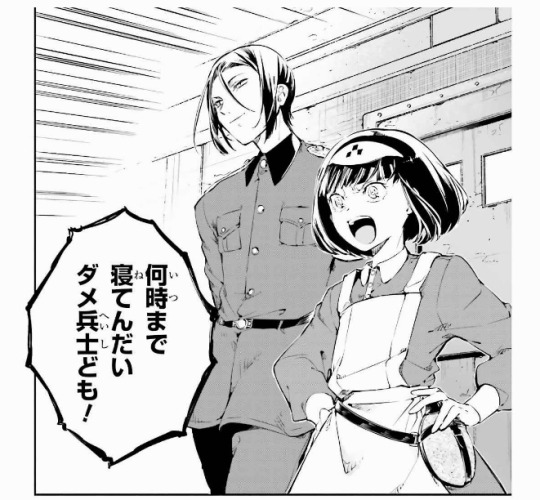
何時 まで 寝て んだい ダナ 兵士 ども! Itsu made nete ndai dana hēshi domo!
何時まで how long, until when. 寝て to sleep. んだい plain and informal んですか. Here it's い instead of か (guestion sentence mark), ん makes it a confirming question and んだ also can express realizations with the nuance of “Oh, gotcha”. 兵士 soldiers. ども indicates plural and shows contempt, disrespect when talking about others. Something like "you, scums / bastards..."
"You're just gonna lie there, aren't you, not-good soldiers?!" (Or more rude)
And that "How dare you to call me yours?! I'm gonna cut / eat your ears off!" 耳喰い千切るよ Mimikuichigiruyo
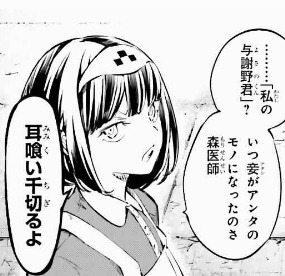
More about her we can learn from this: 先週 まで 和菓子屋 の 店番 だった 妾 を アンタ が 無理やり 徴用したんだろ. Sensū made wagashiya no miseban datta atashi o anta ga miriyari shōyō shita n daro.
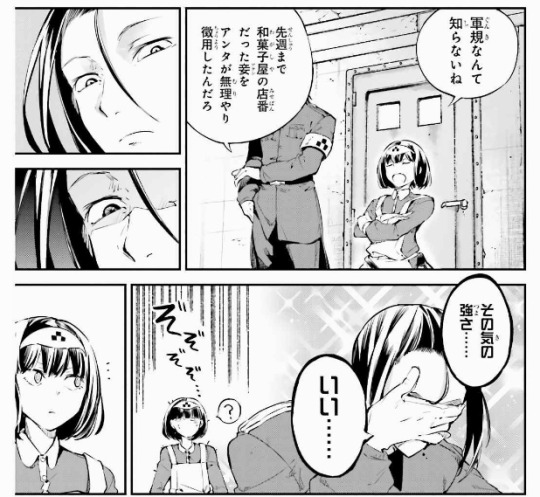
先週まで before the last week. 和菓子屋 shop where you buy wagashi, japanese sweets. 店番 shop assistant. だった the end of plain and informal, not-past sentence. "Before the last week l was a shop assistant in the bakery, ..."
The strangest part is kanji 妾. Dictionary says, it means concubine or mistress. But in manga it's another word!
The kanji readings are ショウ (shoo, しょお), めかけ (mekake, メカケ), そばめ (sobame, ソバメ), わらわ (warawa, ワラワ). In manga we read it as atashi, アタシ, one of female pronouns.
Yosano always use it as pronoun in all chapters.
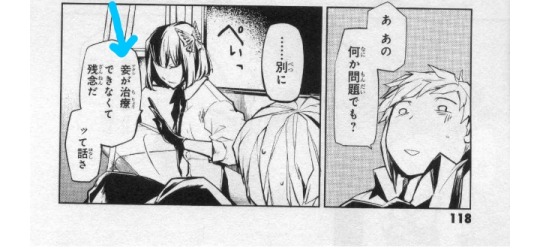
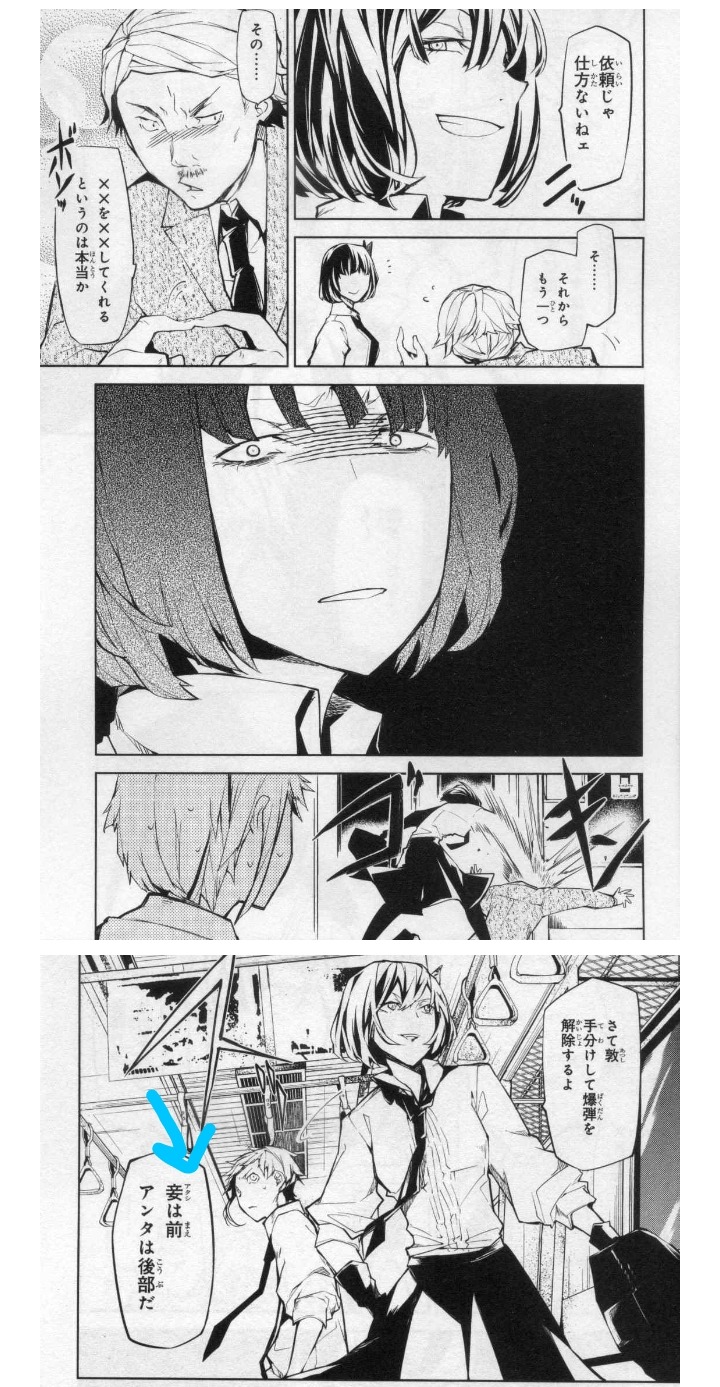
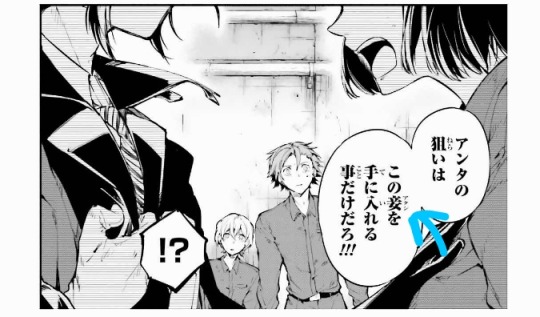
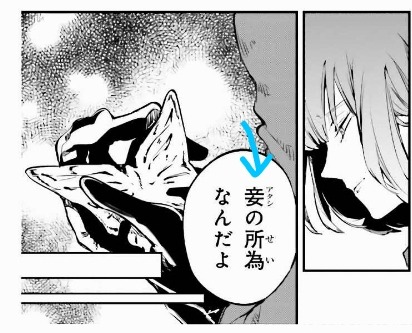
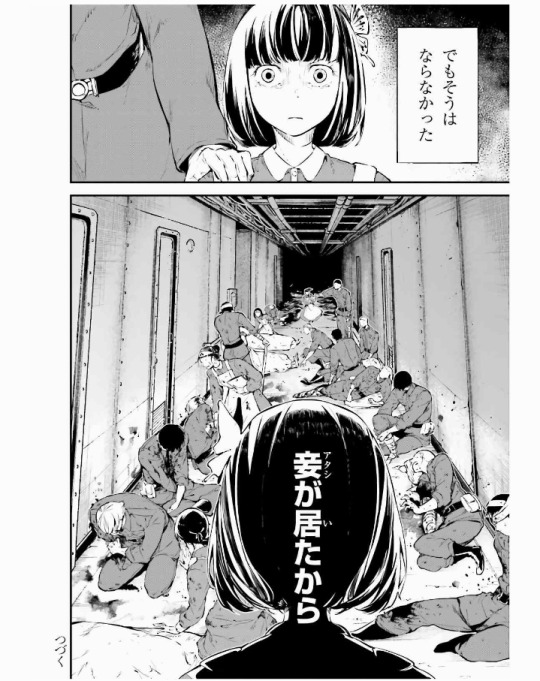
But atashi hasn't kanji.
Japanese kanji it's Chinese kanji but read by another way. In Chinese 妾 is: concubine; I, your servant (deprecatory self-reference for women)
In old Japanese わらわ 妾 warawa used to use instead of watakushi, the most official female pronoun
See? It can be a pronoun. But why? First of all, it's manga, honey! Asagiri can do it if he want. Deprecatory nuance is reference to Yosano's thoughts about herself "People dying even when I do everything I can", " It's because of me", "if only I wasn't there", " I couldn't forgive myself (before chapter 68)". Another thing is one theory about origin of kanji 妾. Now it's 立+女, but in the past it could be 辛 (“torture device”) + 女 (“woman”) = female criminal (isn't it close to her?)
Okay, let's continue
アンタ = you, may be used to express either contempt or affection, depending on tone and context. Yosano very rude with all of them, if it was affection, she would use another words (maybe less rude words at all and "anata", not "anta") Here anta also express her anger.
無理やり against one's will. 徴用 (+する) to conscript, to employ. した is informal する (suru, to do) in the past form. だろ alternative for だろう (darō), informal adverb expressing someone's subjective opinion.
"... But you made me work here even if I didn't want" (or "even didn't give me a choice")
No polite words, this girl doesn't care about subordination at all 😋
Mori admires her fortitude and courage, because as an adult he knows, many other people really would punish her or correct her behavior. I love his reaction) (little parallel between Mori with Akiko and Fuku with Ranpo, both children don't act like good don't-making-problems kids)
She uses informal words and says rude things with adults. But she is more than this badass image. (Much words she uses, irl are more used by men then little girls. But irl atashi is the most girlish pronoun, she could use boku or watashi, but she doesn't do it) She has tight / rigid personal boundaries. She hides behind that mask.
She can show compassion and care, that is the essence of the ability and her soul. She asks soldier who made the hair ornament, "Are you okay? Don't you have any pain?" 躰は平気かい? Even if she already healed him. She is like Gogol. Both are 25/26 years old. Why he murdered people? Why she hurts people almost to the death before healing? Both don't accept the most sensitive and vulnerable part of themselves and don't want to show it. Because of trauma.
#bungou stray dogs#bsd#bsd yosano#yosano bsd#yosano akiko#akiko yosano#bsd akiko#japanese#kanji#japanese pronouns#manga#bsd chapter 65#bsd analysis#translation#you were my inspiration#bsd language analysis
22 notes
·
View notes
Note
hi @brown-little-robin, and thx for the invite. (i hope you don't mind, @quirkle2!)
though i've been a student of japanese culture and a linguistics buff for a couple decades now, i started my language learning journey with this manga in japanese almost 3 years ago. from my limited perspective as a self-taught JSL learner, you're pretty much spot-on. especially about the relationship between voice pitch and politeness!
a few things to keep in mind about pronouns in japanese. this may get confusing, so please bear with me:
japanese is a pronoun-avoidant language.
while it offers a multitude of options for referring to yourself or other objects in speech or writing, they aren't used much in practice. the japanese language is heavily context-dependent: it omits information already understood by all parties in a communication whenever possible, so nouns (and pronouns, words meant to stand in for them) aren't necessary. they're implied in any ‘verbs’ or ‘adjectives’ used in a sentence, and are only employed to clear up ambiguity.
the sentence
「ほら、ピザを作ったの。」 'hora, piza wo ts'kutta no.' (plain/familiar) literally 'look, i [or someone else] made a pizza!'
makes perfect sense in japanese without an explicit subject (mention of the person who made the pizza). ideally it should be clear from context: you're the one sharing your handiwork with your friend, or someone you know is showing you a picture of a pizza his mother made. if who made the pizza is unclear, then you can say something like
「ああ、違う。私の母が作りましたの。」 'ah, chigau, watashi no haha ga ts'kurimash'ta no.' (polite) lit. 'oh no, my mother made [the pizza].'
here the object of the sentence is dropped, where english would require either a noun or a pronoun like ‘it’ or ‘them’ to make clear what was made. not mentioning the cheesy pie or its maker also works in japanese if both are already known, where english collapses in on itself without nouns or pronouns for clarity:
「作りましたの。」 'ts'kurimash'ta no.' (polite, maybe a little bit curt? may need more softening.) '[my mother] made [the pizza].'
here's what pronoun avoidance means in real-time usage.
the japanese take names very seriously. it's considered far more respectful to use a person's name (and/or honorifics, if applicable) when referring to them, even if speaking to them directly. this indeed sounds awkward AF in english, but not in japanese.
using the japanese equivalent of pronouns to refer to or address others can come across as too intimate and therefore rude; using them too often in conversation to refer to yourself can sound stilted or make you come across as self-centered. a good example of this is one common way JSL students are taught to 自己紹介する (jikoshōkai suru, do self-introductions): ‘watashi no namae wa <insert family name, then given name> desu.’ in real-life polite and formal settings, watashi no namae wa or 'my name is' is left out. it’s understood. not doing so isn't 'incorrect', but it sounds clunky and unnatural to native japanese speakers.
from what i understand, pronouns are less commonly used in real-life speech than in media. when japanese authors use pronouns in their work, they’re usually broadcasting compact messages about characters' status, personality or how they see themselves. yakumo referring to himself as atashi in shōwa genroku rakugo shinjū is a sign of his queenly, old-fashioned queerness; his choice of personal pronoun speaks to his delicacy in other senses as well. plucky girl mukai calls herself boku in mob psycho 100; the phenomenon of anime girls and women using so-called 'masculine pronouns' is a whole trope in itself that doesn't always indicate transgender status. (it does, however, point towards either ignorance or flouting of gender norms in a character.)
and now on to your response, @brown-little-robin!
the practice of not using honorifics to address or refer to another is called 呼び捨て or yobis'te in japanese (literal meaning is something like 'throwing away a name'). age, seniority and nobility all confer social status to their holders. 呼び捨て is a privilege given to speakers higher in social status than those they're speaking to; it's only considered rude if you speak like this to someone who outranks you.
shigeo addresses his brother without honorifics because, as the older sibling, his birth order grants him that right. the boys' parents also yobis'te when they speak to their sons, as do shigeo's teacher and reigen when they speak to shigeo. it's not just ekubo. ekubo is generally a rude/direct asshole of the best kind, but here his simply calling shigeo by his given name is appropriate. he is so old he doesn't remember his own age, which already gives him a higher spot in the social hierarchy. and shigeo himself demands ekubo use his name. the boy, so vehemently against being called 'shige-chan' that he threatens to send ekubo to the shadow realms for it, never objects to the ghost yobis'te'ing him, either.
pronouns can also function in this status-based way. if you know a person's name, it's more polite to use it or omit it entirely than to substitute for it. if the other person is a stranger, you have options: onee/onii-san (big sister/brother), oba/oji-san (aunt/uncle), among others. (i'm still learning these.) pronouns are for intimates or social inferiors only.
teru's addressing ritsu as soko no kimi or 'you over there, who appears to be younger than me' before they even establish their places in the hierarchy with each other is overfamiliar AF, in keeping with his personality. he switches to otouto-kun or 'little brother-kun' once they get to know each other a little better. shigeo uses kimi with shou when they meet: not unfriendly, but assertive of the higher social rank he occupies. shou is younger and looks it. on the other hand, shigeo calling reigen anta (a corruption of the second-person pronoun anata) in the manga? HELLA rude.
i love your descriptions of ekubo's accent (and what it looks like for you as a synaesthete! that's so cool) here; i've long wondered who decided that delinquent, rough, yakuza-like characters should roll their 'ra-ri-ru-re-ro' sounds like they're gargling gravel. ekubo's voice actor akio ōtsuka has made a name for himself over decades playing characters with big burly voices. he squeezes a lot of emotive range out of this sly green specter: from wheedling, prurient nasality to near-regal grace and pride. polite tōkyō accents tend towards much less variation in pitch and tone, even under stress. ekubo also slurs and relaxes/contracts his speech quite a bit, for an even rougher sound to the polite tōkyō ear. generally speaking: the shorter the expression or the more relaxed the pronunciation, the ruder or more familiar it is. (the links in this paragraph lead to pages at japanesewithanime.com with depth outside the scope of my response here. it's a great resource.)
hope this helps and isn't too overwhelming! cheers to you both.
notes:
'verbs' and 'adjectives' are in quotes above, because many expressions that would be adjectives in english are actually verbs in japanese. for example, 'angry' is a verb: 怒る・okòru/ikàru, 'to be angry'. verbs can take endings when conjugated that effectively transform them into adjectives (-nai: 'doesn't or won't'; -tai: 'wants to, would like to'). some adjectives are also nouns, many of which take する・suru ('to do/perform/cause, etc.') to become verbs. confused yet? *weeps bitterly*
a bit advanced, perhaps? but japanese allows use of words for direction to fill in where english speakers would employ first-, second- or third-person pronouns: kocchi/kochira (lit. ‘over here’, near the speaker), socchi/sochira (lit. ‘over there’, near the listener), acchi/achira (lit. 'over there', distant from listener and speaker). these are polite and respectful.
HI so sorry to barge in here unannounced like this but u seem to have a lot more knowledge about japanese language/culture/social etiquette than i do and i've seen u mention dimple's mannerisms in canon once or twice and like . i'd love to hear more abt that if ur willing to ramble for a bit. i've been Very curious just how far dimple's Rudeness goes, but i know very little about the culture. i'm sure some things he does or says seem fairly normal to me but is considered very rude or disrespectful to the characters. no pressure tho ofc :]
hi Rika!! literally drop in anytime! I,, I appreciate this ask so much and will answer as best as I can, but I'm a very new student of Japanese and Japanese culture, so take what I say with a grain of salt! also I personally am going to tag @russenoire to respectfully invite them to partake in this conversation if they think it would be fun (no pressure of course!). they have been studying this much longer than I have :}
putting my thoughts under a cut because !!! I love to ramble!!! note: all of this is based on Dimple's Japanese voice & mannerisms from the anime. I don't have the manga in Japanese yet 🙏
As a preface: Ekubo's direct/rude/familiar speech style is typical in anime and not unheard-of in real life, but it's definitely worth noticing! Mob Psycho 100, particularly, gets a lot of its unique interest out of taking unrealistic anime expectations and saying "HEY pay attention to this, WHY is this happening, this is immature behavior, why are adults in this universe letting this happen", and making it funny and/or serious. So!!! let's dive in.
So, okay, Dimple's mannerisms. The first thing to know is very general. he usually speaks in the casual register (which has a whole distinct vocabulary from the more polite registers: for instance, he tends to end his sentences with "da" rather than "desu", which are both "is" verbs with the exact same meaning, just a different connotation). the casual register is comparatively... direct. Dimple using casual implies that he thinks of himself as on familiar terms with and/or higher in the social hierarchy than whoever he's speaking to. casual Japanese is par for the course in anime in general, especially for people expressing arrogance, like Ekubo does all the time. But still, that's A Choice. it expresses simultaneous superiority (I am allowed to speak to you in informal terms because I'm above you) and also, possibly, desire for closeness (Ekubo speaks to Shigeo in familiar terms like they're brothers).
(Politeness, respect, and distance are linked in Japanese. Casual language isn't always rude, but in the wrong situation, it can be jarring and disrespectful. Using casual Japanese is a sign of confidence and personal closeness in your relationship with someone—new friends will switch from formal to casual language at some point and typically never go back; siblings use casual language with each other as a matter of course. It's very situational.)
The second thing to know is, there are choices of first person pronouns in Japanese!!! And Ekubo's choice is spectacular. He refers to himself as "ore-sama". "ore" (roughly pronounced "o-ray") is one of two typical Japanese casual male pronouns, ore and boku. (the formal first-person pronoun for men is watashi). To my knowledge, "ore" was originally the only casual male pronoun, and then "boku" entered popular use as a more humble option and changed the meaning of the formerly more neutral-sounding "ore" by competing with it, which is fascinating. but I'm getting distracted. "ore" is the more aggressively masculine pronoun; it's considered rough/direct to the point of being rude in many contexts. And Ekubo doesn't just use "ore" (ore is a widely-used choice!), he adds the honorific -sama to the end. This is extremely macho. SUPER arrogant. It tracks with his desire to become a god: -sama is the honorific for kami as well as the honorific for people who are way higher ranked than you. giving someone the honorific -sama expresses a greater gap between you and them than -san does. this is hilarious to me. Dimple is over here referring to himself as 🔥 ME 👑 every time he uses first-person pronouns. (Mob uses boku, btw.) ore-sama isn't not used irl, but it's, uh. highly highly unusual, from what I can tell. sounds like a biker gang boss kind of thing to me—something someone on the fringes of society would use. no shade to those outside "polite society" from me, btw, I'm just stating the general connotation from a majority cultural perspective.
OH AND SPEAKING OF HONORIFICS. I'm guessing you've seen analysis of this before and/or just Get It from cultural osmosis, but Dimple calls Shigeo "Shige-chan" the second time they meet. -chan is a usually-affectionate diminutive usually given to girls younger than yourself or celebrities people find cute; I think they translate it as "li'l Shige" in the English dub? -chan has cutesy connotations and can be infantilizing if it's not used with permission and/or some kind of... y'know... familiarity and understanding between the person giving the honorific and the person being referred to with -chan. it is super disrespectful of Dimple to call Shigeo Shige-chan having just met him, and having gotten off on a terrible foot with Shigeo, no less. what the heck, Ekubo!!
And then Dimple proceeds to call him just Shigeo with no honorific at all, which is ALSO disrespectful?? given that Dimple doesn't know him, really?? too familiar, too abrupt! As a strange adult, he should be calling him Shigeo-kun! But he's treating Mob like a little brother. (For instance, as the older brother, Shigeo has the right to call Ritsu by the first name and only the first name, whereas Ritsu usually calls Shigeo "Nii-san". To my knowledge, that's not unnatural in Japanese the way it would be in English; it's not Ritsu reiterating their bond every five seconds, it's just the Expected Thing for the younger brother to refer to the older brother as "Nii-san" out of respect. you'll see the Shiratori brothers, Daichi and Kaito, doing the same thing if you pay attention. to each other, they are "Kaito" and "Nii-san". BUT ANYWAY)
Another Dimple regularly does that reads as arrogant/direct to me is sometimes speaking in a Really Low Voice. This is where my knowledge gets hazy—it's more about pronunciation and accent than "behavior" as such, so bear with me, but the general pitch of one's voice is important in Japanese. Girls and women tend to pitch their voices higher than their natural range in Japanese, especially when doing "polite" or "customer service voice". Japanese speaking men often raise their pitches for politeness/to express humility or a conciliatory attitude too, even though it's not as extreme as with women. And men who are performing aggression will often lower their pitch on purpose, creating a growling kind of effect. Dimple does this a lot. Let me see if I can embed a video of him doing it here
YES. OKAY. Listen to the difference between his mental voice and his spoken voice here!! Dimple uses a higher pitch when talking to Mob because he's trying to ingratiate himself with Mob, but then when he's muttering to himself, he reverts back to his evil-spirit, gang-boss, stereotypically-yakuza-sounding kind of... deep growl.
Relatedly, Ekubo rolls his r's. he rolls them hard. That's a really rough way of speaking, definitely not typical in "polite" Japanese. people learning Japanese are told not to roll their r's unless they want to sound like they're yakuza wannabes. (He also, to my ear, tends to kind of roll his vowels?? he puts his voice backwards in his mouth, pronouncing things either near his nose or deep in his throat, and kind of crushes them with his mouth as they emerge. I don't know if there's a word for this, but to my synesthesia it looks like his voice goes spiky. it's a COMPLETELY different sound than the smooth pronunciation of polite Tokyo-style Japanese. I don't actually have a point this is just interesting to me)
That's about all I have for now! I'm fascinated by Dimple's speaking style and what it says about him. Sorry this was more about accent than behavior—as far as behavior goes, I mean, he's weird. he's weird! as a ghost, he's not really a part of society and he just wanders around making fun of people, which would be rude in any culture. I have a whole Other rant about how Dimple improved as a person after Reigen started treating him as an employee and how that adds to MP100's theme of society and connection, but now is not the time. I hope this has been interesting to you!! Thank you for the ask!
#mp100#mp100 meta#langblr#japanese#japanese pronouns#japanese grammar#word usage#studyblr#japanese language#japanese langblr#日本語#分析#文法#responses#i don't have pizza on the brain i swear#i just made one for a late lunch
49 notes
·
View notes
Text

bonney normally speaks very coarsely- she usually uses omae as her ‘you’ pronoun, which is uncommonly rude and aggressive for women and is normally only used by men. however, when she addresses luffy-as-nika for the first time directly, to say “i’ve been searching for you,” she switches over to anta for ‘you’, which is still informal but far less confrontational.
and then when luffy is just completely not getting it in the next line (“huh? we’ve been together this whole time!”) bonney instantly snaps back to using omae again for her subsequent lines. respect gained -> lost speedrun INSTANT
#one piece#japanese#jonny reads op#op#luffy#bonney#ch 1107#arc: egghead island#the pronoun game#opspoilers#gear 5
1K notes
·
View notes
Text
Unsurprisingly, people are already being fucking weird about Mizu's gender.
Headcanons are all well and good, but maybe we shouldn't be so eager to apply modern Western gender politics and terms to a character whose identity is so tied to the time, place, and circumstances in which she exists.
Please remember that Mizu was forced to present as male for her own safety and agency. Please remember that allowing others to see her as a man and call her he/him is not a choice; it's protection; it's a means to an end. Until we see Mizu talk about her gender in further detail, that's all the context we have.
Don't project what you want to see onto her and then treat it as fact.
#Blue Eye Samurai#BES#Svar rants#also as an enby who doesn't use they it super rubs me the wrong way to see people insisting on calling her they#even if she *is* genderqueer or nonbinary (and we don't know that she is) that does not mean that they automatically applies#and if you think that it does please go back to Gender 101 do not pass go do not collect $100#on top of that there's the whole issue of applying English pronoun politics to a Japanese speaker#like I'm begging y'all to consider cultural and historical context before y'all go gallivanting off with your readings of Mizu's gender#taking a baseball bat to a hornet's nest with this one I know but I'm Bothered
621 notes
·
View notes
Text
looking at all the characters Japanese pronouns made me notice that kid sidekicks in Sonic are either polite/formal or casual/informal to contrast their partner
Sonic uses ore (casual) and Tails uses boku (polite)
Amy uses atashi (casual) and Cream uses watashi (polite)
Blaze uses watashi (polite) and Marine uses uchi (casual) (they’re only pair where the sidekick is the casual one)
i don’t know if Surge and Kit have Japanese pronouns yet but Kit speaks very politely (calling Surge ma’am and stuff ) and Surge is the living embodiment of punk rock so she’s hella informal
Silver uses ore like Sonic but he also calls other people anta like Amy and Rouge do (he be acting like Rouge again) so if Silver got a kid sidekick then they’d be extra polite/formal like Kit and Cream
#sonic the hedgehog#silver the hedgehog#tails#amy rose#cream the rabbit#blaze the cat#marine the raccoon#surge the tenrec#kit the fennec#idw sonic#the japanese language rabbit hole is really deep and really really nuanced#i didn’t even get into all the second person pronouns because i’m not an expert but they mostly follow the same patterns#japanese
64 notes
·
View notes
Text
Kodaka may have made some writing mistakes over the years but i think he did really well with Halara, honestly. a well-rounded enbee, badass with flaws and as handsome as they are adorable.
i can't recall where Kodaka said this, but if i'm remembering correctly, he even made it clear he had no intended "secret gender" for them while Designing - he went in with genderless in mind. in English, which is not his first language and which he is still learning, he even defaults to a neutral "that person." pretty neat and unexpected.
#kazutaka kodaka#halara nightmare#note that japanese handles pronouns differently to say the least so while “that person” may not be the greatest way to refer to Halara#i give him a pass
61 notes
·
View notes
Text
Under the cut is every single submission I have so far


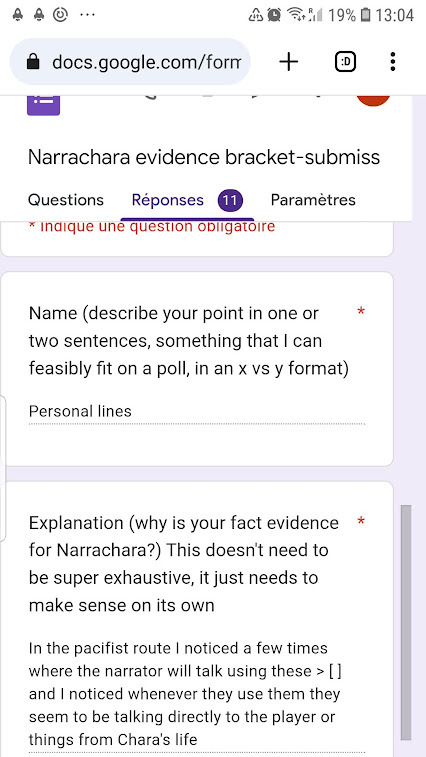

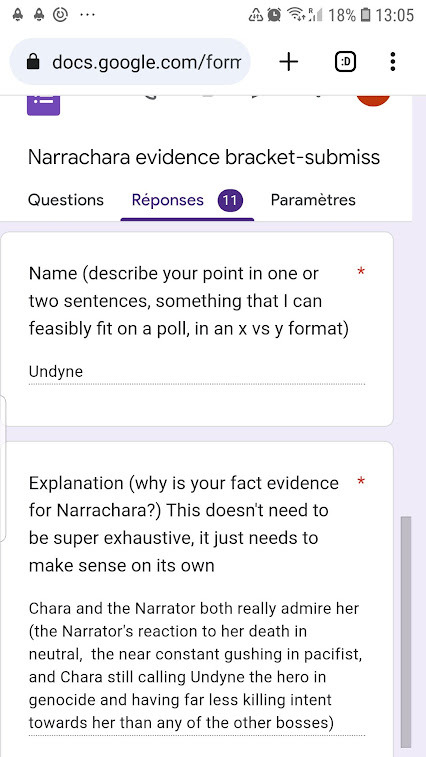

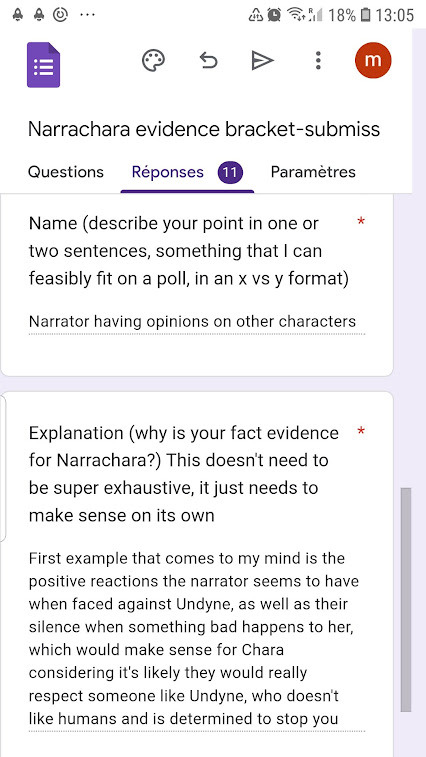

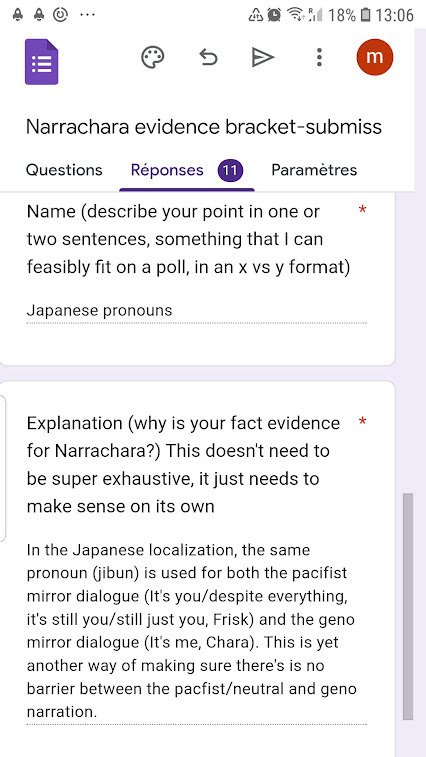

I really think we're getting somewhere now!
#long post#yes I'm sharing these so I can start finding the screenshots what of it#genocide lines#personal lines#undyne#serious mode#flavour text in certain fights#japanese pronouns#no narration in photoshop flowey fight
12 notes
·
View notes
Text
as far as being a trans person in japan goes, despite all of the difficulties that come with that, I think one of the most accommodating things has been... just the nature of pronouns themselves, in the language.
sure, literal translations of gendered third person pronouns exist (彼 and 彼女, kare and kanojo, he and she respectively), but... like, nobody uses them. for one, they're both words for "boyfriend" and "girlfriend" respectively (even if 彼氏, kareshi, is more common than just 彼), so you run the risk of a... rather awkward miscommunication. but, perhaps more pertinently, it's much more common to just use a person's name or title.
on the other hand... you know what does have gendered nuance and is commonly used? the word "I." or, more precisely, all the different first person pronouns in the language.

just by saying "I," "me," or "my," you can... so seamlessly make a statement about yourself and your identity in the middle of nearly any sentence.
queer people use this to express their gender identity. queer people use this to express their subversion of gender roles, too. in retrospect, it makes saying "my name is [name] and my pronouns are [pronouns]" feel so clunky when I can just... move on to my next idea, and just casually convey similar information!
speaking english in the states, i feel like it can be dangerous, sometimes, to introduce yourself with your pronouns, especially when the whole point is to greet people you're meeting for the first time. best case scenario, it's like, oh, those are your pronouns, that's cool. worst case scenario, it's "oh, pronouns? you're one of those trannies, aren't you?" much more commonly, though, is "oh he identifies as a woman," which Makes Me Want To Tear My Hair Out All The Time Why.
when i'm in japan, though, I can just be me, and simply, casually, refer to myself as such. and I think that's pretty cool.
(for more on queerness and gendered language in japanese that delves into A Whole Lot More Nuance, check out this tofugu article)
#that being said you still shouldnt overuse the first person pronoun in sentences where its contextually obvious if you wanna sound fluent ww#japanese#language#lgbt#trans#linguistics#rambles
449 notes
·
View notes
Text
Do you know this queer character?
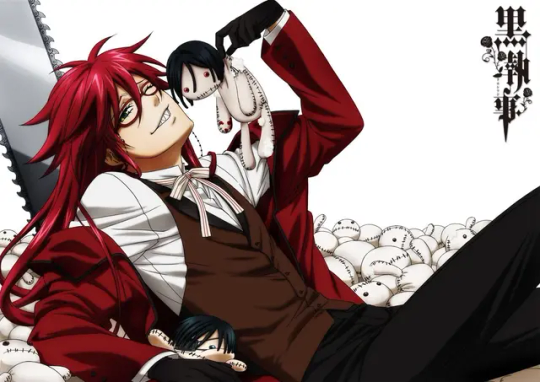
Grell is Transgender and uses she/her pronouns!
#this is a fucking rough one lmao please have mercy on me#basically the character is referred to as an “okama” but uses feminine pronouns for herself in japanese and she calls herself a lady#also she has a line about falling in love with a woman but it's dubious enough I didn't add bisexual but lmk if I should#but this is very very controversial possibly the most controversy i've seen researching any of these characters for this blog so have mercy#also is it grell or grelle i've seen both interchangeably#grell sutcliff#black butler grell#grelle sutcliff#black butler#tumblr polls#fandom polls#poll#transgender#she/her#anime#lgbtqia#do you know this queer character
176 notes
·
View notes
Text
diversity win! the crusader knight who helped create a museum based around the preserved corpses of their genocides victims is nonbinary!
#fire knight hilde#fun fact they arent referred to with pronouns in english or japanese#or any gendered terms#elden ring#elden ring shadow of the erdtree#shadow of the erdtree#elden ring sote#er sote
59 notes
·
View notes